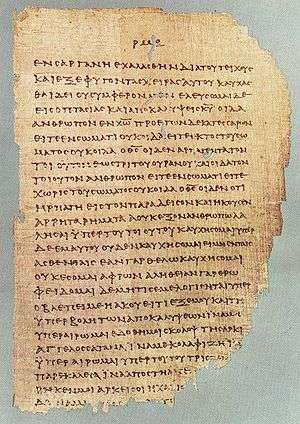2 Corinthians 2
| 2 Corinthians 2 | |
|---|---|
|
A folio of Papyrus 46 (written ca. AD 200), containing 2 Corinthians 11:33-12:9. This manuscript contains almost complete parts of the whole Pauline epistles. | |
| Book | Second Epistle to the Corinthians |
| Bible part | New Testament |
| Order in the Bible part | 8 |
| Category | Pauline epistles |
2 Corinthians 2 is the second chapter of the Second Epistle to the Corinthians in the New Testament of the Christian Bible. It is authored by Paul the Apostle and Saint Timothy.[1][2]
Text
- The original text is written in Koine Greek.
- Some most ancient manuscripts containing this chapter are:
- Papyrus 46 (ca. AD 200)
- Codex Vaticanus (AD 325-350)
- Codex Sinaiticus (AD 330-360)
- Codex Alexandrinus (ca. AD 400-440)
- Codex Ephraemi Rescriptus (ca. AD 450)
- Codex Freerianus (ca. AD 450; extant: verses 3-4, 14)
- Codex Claromontanus (ca. AD 550)
- This chapter is divided into 17 verses.
Structure
This chapter can be grouped (with cross references to other parts of the Bible):
- 2 Corinthians 2:1-2 = Sparing the Church
- 2 Corinthians 2:3-11 = Forgive the Offender
- 2 Corinthians 2:12-17 = Triumph in Christ
Verse 17
- For we are not, as so many, peddling the word of God; but as of sincerity, but as from God, we speak in the sight of God in Christ.[3]
- For we are not as many
The apostle here removes from himself, and other ministers of the Gospel, a character which belonged not to them, but to the false apostles; who are described by their number many; there were great swarms of false teachers in the early times of Christianity; see (1 John 2:18); (1 John 4:1) ; some copies read, "as the rest": and so the Syriac and Arabic versions; and also by their quality,[4]
- peddling the word of God; (KJV: which corrupt the word of God;)
by "the word of God", may be meant the Scriptures in general, which are from God, contain his will, and which he uses for the good of men, and his own glory, and may be corrupted by false glosses, and human mixtures, and by adding to them, or taking from them; or the Gospel in particular, which is the word of truth, of faith, righteousness, reconciliation, and salvation, and which was corrupted by these false teachers, by making merchandise of it; they huckstered the word of God, made gain of it, sought merely their own worldly interest and advantage in it, and so mixed it with their own vain philosophy, to please the carnal ears and hearts of men; they blended law and Gospel, grace and works, in the business of salvation; they did, as peddling merchants do, mix good and bad commodities together, and then vend them for sound ware; or as vintners, who mix their wine with water, and sell it for neat wine. The Septuagint interpreters on (Isaiah 1:22), translate the last clause of that verse thus, (oi kaphloi sou misgousi ton) (oinon udati), "thy vintners mix wine with water"; which may be understood in a moral or spiritual sense; so did these men mix, and hereby corrupt the Gospel, the word of God; and so the Syriac version reads the words (Nygzmmd), "who mix the word of God": now the apostle says, they did not do so; they delivered out the word pure and unmixed, without any corruption or adulteration:[4]
- but as of sincerity, but as of God, in the sight of God, says he, speak we in Christ;
they spoke "in Christ", in the name of Christ, of or concerning him, and him only, and freely, fully, and plainly, as God's free gift, and the only way of salvation without the works of men: and they spoke, "as of sincerity"; what they delivered was the sincere milk of the word; the manner in which they did it was sincere, with all integrity and faithfulness; and so were their views, which were not their own profit and applause, but the glory of God and the good of souls; they spoke in Christ, and with all sincerity, "as of God"; by whom they were called and sent forth to speak in his name, and from whom they received the Gospel, and gifts, and abilities to preach it; and all this they did, in the sight of God, as the searcher of hearts, and to whom they knew they must give an account of their ministry another day.[4]
See also
- Jesus Christ
- Macedonia
- Titus
- Troas
- Other related Bible parts: 2 Corinthians 1, 1 John 2, 1 John 4
References
- ↑ Halley, Henry H. Halley's Bible Handbook: an abbreviated Bible commentary. 23rd edition. Zondervan Publishing House. 1962.
- ↑ Holman Illustrated Bible Handbook. Holman Bible Publishers, Nashville, Tennessee. 2012.
- ↑ 2 Corinthians 2:17
- 1 2 3 John Gill's Exposition of the Entire Bible, - 2 Corinthians 2:17
